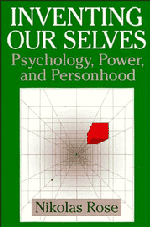Book contents
- Frontmatter
- Contents
- Acknowledgments
- Introduction
- 1 How should one do the history of the self?
- 2 A critical history of psychology
- 3 Psychology as a social science
- 4 Expertise and the techne of psychology
- 5 Psychology as an individualizing technology
- 6 Social psychology as a science of democracy
- 7 Governing enterprising individuals
- 8 Assembling ourselves
- Notes
- Bibliography
- Index
3 - Psychology as a social science
Published online by Cambridge University Press: 04 August 2010
- Frontmatter
- Contents
- Acknowledgments
- Introduction
- 1 How should one do the history of the self?
- 2 A critical history of psychology
- 3 Psychology as a social science
- 4 Expertise and the techne of psychology
- 5 Psychology as an individualizing technology
- 6 Social psychology as a science of democracy
- 7 Governing enterprising individuals
- 8 Assembling ourselves
- Notes
- Bibliography
- Index
Summary
To many of its critics, psychology is an ‘antisocial’ science, focusing on the properties of individuals abstracted from social relations, reducing social issues to interpersonal ones, servicing an unequal society. There is much of value in such criticisms. But suppose we were to reverse our perspective, to view psychology as a profoundly social science. The subdiscipline of ‘social psychology’ would be located within a broader web of relations that connect even the most ‘individualistic’ aspects of psychology into a social field. It is not only that truth is a constitutively social phenomenon: like any other body of knowledge staking its claims in the commonwealth of science, the truths of psychology become such only as the outcome of a complex process of construction and persuasion undertaken within a social arena. It is also that the birth of psychology as a distinct discipline, its vocation and destiny, is inextricably bound to the emergence of the ‘social’ as a territory of our thought and our reality.
Governing social life
No doubt all humans are social animals. But the social territory is a historical achievement, a shifting and uncertain terrain that began to consolidate in Western societies in the nineteenth century (cf. Deleuze, in Donzelot, 1979). It is he terrain implied by such terms as social security, social welfare, social workers, and social services. The social is a matrix of deliberation and action, the object of certain types of knowledge, the location of certain types of predicaments, the realm traced out by certain types of apparatus, and the target of certain types of program and ambition.
- Type
- Chapter
- Information
- Inventing our SelvesPsychology, Power, and Personhood, pp. 67 - 80Publisher: Cambridge University PressPrint publication year: 1996

